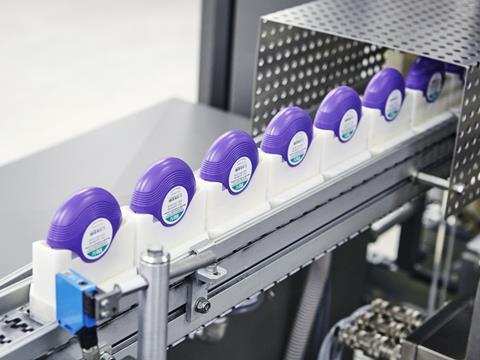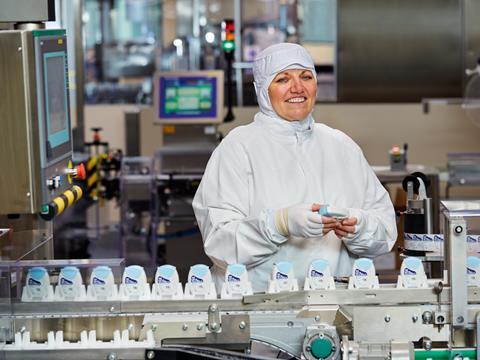
Angus Freeman, head of packaging lifecycle management at GSK, discusses with Tim Sykes how serialisation looks in the context of one of the world’s largest pharmaceutical companies.
How has GSK approached the task of ensuring compliance with the EU Falsified Medicines Directive?
Security in the manufacture and delivery of high quality medicines, for the protection of patients has, and always will be, critical to the pharmaceutical industry, to GSK and indeed to me personally. The Falsified Medicines Directive is a significant piece of EU legislation that supports that mission by requiring manufacturers to place safety features on all prescription medicines, and to contribute towards the establishment of an EU wide IT verification system that will allow assessment of the authenticity of a medicine at the point of dispensing to the patient. Being compliant with all relevant legislation is of upmost importance for us at GSK and helps us build trust with regulators, with our supply chain partners and ultimately with our end users – healthcare practitioners and patients.
How are we approaching this? In simple terms we have adopted a five-stage process.
- We start by analysing the legislation to ensure that we have a clear and consistent understanding of the applicability and requirements of the legislation,
- Next, we assess our current ways of working in light of those requirements – identifying any gaps and opportunities to improve,
- The third step is to develop an agreed roadmap to address the identified opportunities
- Then we are building our organisational capability through brilliant execution led by a dedicated cross functional team with specialist knowledge and experience.
- This is ongoing activity as opposed to a one-off process, we continue to work with internal and external organisations to fine tune the plan.
Our experiences from successfully meeting similar legislation in other parts of the world are great learning for us and building that learning into our approach and plans for Europe continues to be massively beneficial; the Drug Supply Chain Security Act being a very good example of where we have gained highly relevant learning.
What measures do we have in place? From my perspective, building organisational capability requires you to consider your people, processes, and organisational and technical systems. Serialisation is no different in that regard. As with any significant programme of work, identifying both the critical internal and external milestones and measures and managing your performance against these indicators is a key part of brilliant execution: for example, understanding our suppliers capacity and capability to supply the required capital equipment for our packaging lines is as important as understanding where we are on the IT systems deployment, and considering and factoring in any impacts of Brexit on our artwork capability is important in the tracking of our progress on the artwork changes that we are making on each of the 3000 different packs we manufacture for supply in the EU.

What have been the biggest challenges associated with serialisation?
A change programme of this size brings lots of exciting challenges and those challenges are something the team at GSK are thriving on and meeting. By the end of 2017 we had already successfully serialised more than 80 million packs for supply across the globe, and that is something the team and I are incredibly proud of. From my perspective, the three biggest challenges we have faced with regards to serialisation are:
- Getting absolute clarity on the requirements of the legislation for individual markets - With serialisation being an emerging requirement in the pharmaceuticals and healthcare industries, we continue to work with the industry and with regulators around the world to understand and support their evolving needs, and we have dedicated resources in place specifically focussed on this activity.
- Defining and building the organisational capability within GSK - GSK is a global company operating in more than 100 countries, manufacturing and supplying several billion packs per year to millions of patients and consumers around the world. Introducing significant changes to the way we operate across a large global network can be challenging and we have leaned on our previous successful experiences, building and utilising standard solutions wherever possible.
- Establishing the correct external partners – having clarified the requirements, identifying and establishing the best network of external providers has been critical to our success and our suppliers continue to play a significant role in supporting and indeed improving our solutions.

As a leading international business, GSK must be more affected than most by the diversity of regulatory systems across the globe. How do you handle this challenge?
Regulatory compliance is critical for any pharmaceutical company and helps ensure that we provide the best possible products to our patients and consumers each and every time. The scale of GSK does mean we are impacted by many regulatory changes and challenges, but our size is also a key enabler in successfully meeting those challenges. We have great people throughout the company, with very relevant experience built within and outside the organisation. We have teams and individuals based centrally and in markets and we are constantly seeking to better understand the regulatory landscape, to interpret the requirements, and implement timely and appropriate enhancements to the way we work.
Do you see serialisation as an opportunity to go beyond regulatory compliance and achieve further benefits for your business?
Absolutely! While our primary focus will remain on ensuring we meet the regulatory requirements, we are also exploring how we maximise the significant investments we are making to improve the efficiency of our supply chains. We live in exciting times with the pace of technological change accelerating year-on year. Effectively harnessing the data that serialisation will generate will provide us with many opportunities that will not only help GSK, it will also give us opportunities to enhance the whole supply chain increasing the quality of the service and supply to our patients and consumers around the world.

Is GSK exploring innovation in smart/active packaging for improved customer experience?
Historically, pharmaceutical packaging has been there to protect the product and clearly identify what it is and how it should be used. Technological advances give us a fantastic opportunity to build on those critical characteristics and potentially enhance how healthcare professionals and patients interact with our medicines. We are seeking to learn from other industries which have already embraced some of these opportunities and we are working with regulatory bodies to see how best we introduce these enhancements to the benefit of our patients.
















